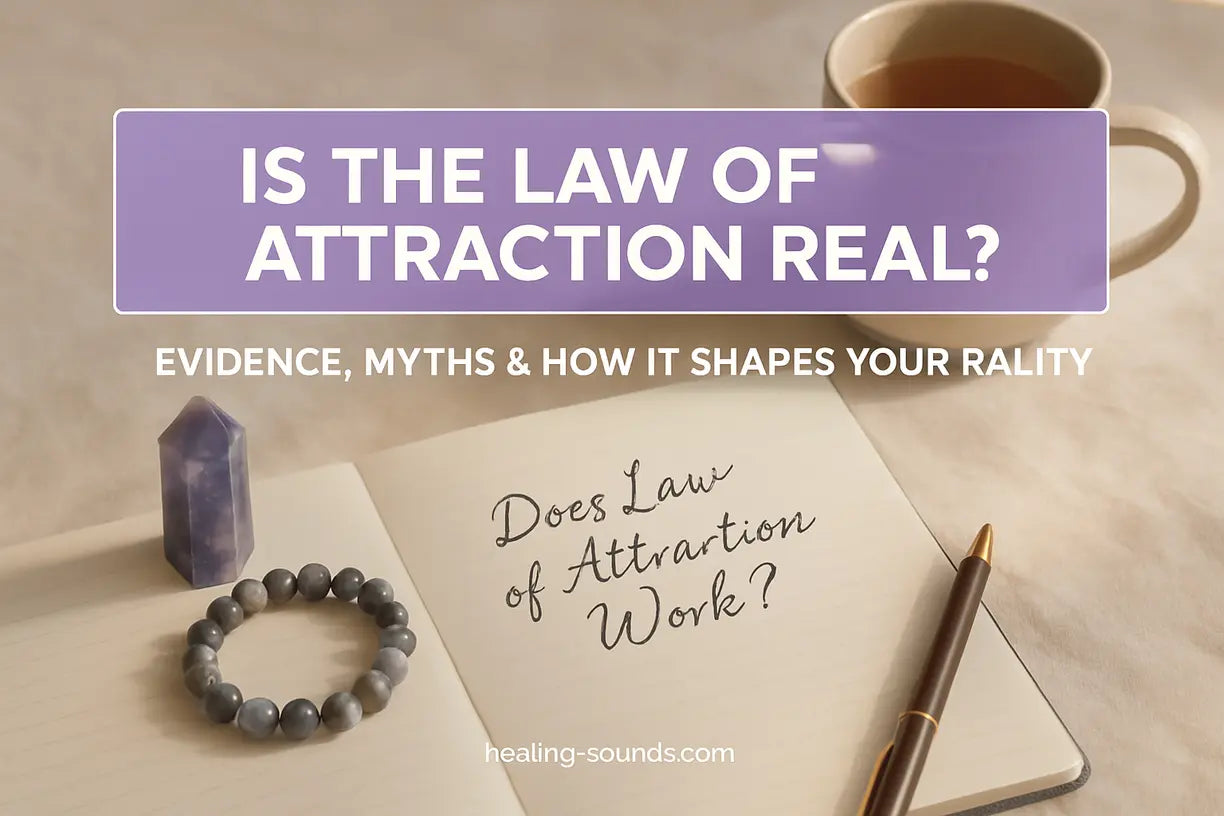Ist das Gesetz der Anziehung real? Diese Frage wird in Online-Foren, Wellness-Kreisen und nächtlichen Gesprächen immer wieder gestellt. Für viele ist es ein mächtiges Werkzeug zur Verwirklichung von Träumen; für andere ist es ein von Skepsis umhülltes Konzept. Wenn Sie spirituell neugierig sind, aber auch einen fundierten, evidenzbasierten Ansatz zur Selbstentwicklung schätzen, sind Sie hier richtig. Wir gehen über den Hype hinaus und bieten eine ausgewogene, fachkundige Analyse.
Dieser Artikel geht der Kernfrage nach: Funktioniert das Gesetz der Anziehung? Wir gehen auf die wissenschaftlichen Prinzipien ein, die oft damit in Verbindung gebracht werden, untersuchen die psychologischen Mechanismen, die seine Wirksamkeit bestimmen, und gehen ehrlich auf die häufigen Kritikpunkte ein. Sie erhalten ein klares Verständnis davon, was das Gesetz der Anziehung ist, was nicht und wie Sie seine praktischen Prinzipien anwenden können, um gezielte, positive Veränderungen in Ihrem Leben herbeizuführen.
Das Gesetz der Anziehung entschlüsseln: Jenseits des Hypes
Vereinfacht ausgedrückt, ist das Gesetz der Anziehung der Glaube, dass positive oder negative Gedanken positive oder negative Erfahrungen in das Leben eines Menschen bringen. Die Kernidee lautet: „Gleiches zieht Gleiches an“ – indem man sich auf positive Ergebnisse konzentriert, kann man diese in die Realität ziehen. Obwohl dieses Konzept durch Bücher und Filme wie „The Secret“ populär wurde, sind seine Wurzeln viel älter und finden sich in verschiedenen philosophischen und spirituellen Traditionen.
Es ist jedoch wichtig, zwischen zwei Interpretationen zu unterscheiden:
- Die mystische Sichtweise: Diese Perspektive geht davon aus, dass sich das Universum buchstäblich neu ordnet, um Ihrer Schwingungsfrequenz zu entsprechen. Wenn Sie an Reichtum denken, ziehen Sie auf magische Weise Geld an, ohne dass Sie dafür etwas anderes tun müssen.
- Die praktische Sichtweise: Dieser Ansatz betrachtet das Gesetz der Anziehung als einen wirkungsvollen Rahmen für die persönliche Entwicklung. Er argumentiert, dass die Konzentration Ihrer Gedanken und Energie auf Ihre Ziele Ihre Denkweise, Gewohnheiten und Handlungen verändert, was wiederum zu unterschiedlichen Ergebnissen führt.
Bei unserer Analyse konzentrieren wir uns auf die praktischen, psychologischen und wissenschaftlichen Prinzipien, die helfen zu erklären, warum so viele Menschen bei der Anwendung dieser Ideen tiefgreifende Veränderungen erleben.
Die wissenschaftliche Linse: Gibt es Beweise für das Gesetz der Anziehung?
Direkte, von Experten überprüfte wissenschaftliche Beweise, die das Gesetz der Anziehung als universelles, metaphysisches Gesetz belegen, gibt es nicht. Mehrere etablierte Konzepte aus Psychologie und Neurowissenschaften bieten jedoch überzeugende Erklärungen dafür, warum es zu funktionieren scheint und warum die damit verbundenen Praktiken so effektiv sein können. Diese Prinzipien beweisen zwar nicht die kosmische Anziehung, aber sie bestätigen die Macht des Geistes.
Das retikuläre Aktivierungssystem (RAS)
Ihr Gehirn wird ständig mit Informationen bombardiert. Das retikuläre Aktivierungssystem (RAS) ist ein Netzwerk von Neuronen, das als Filter fungiert und entscheidet, welche Sinnesinformationen Ihre bewusste Aufmerksamkeit erregen. Wenn Sie entscheiden, dass etwas wichtig ist – wie zum Beispiel das Ziel, mehr Wohlstand zu erreichen –, programmieren Sie Ihr RAS im Wesentlichen darauf, danach zu suchen. Sie ziehen nicht wie von Zauberhand neue Möglichkeiten an; vielmehr beginnt Ihr Gehirn , die bereits vorhandenen Möglichkeiten zu erkennen . Um mehr über diese Gehirnfunktion zu erfahren, erklären Experten von Psychology Today , wie das RAS nach dem filtert, was Sie für wichtig erachten.

Bestätigungsfehler und der Placebo-Effekt
Zwei weitere psychologische Phänomene spielen eine bedeutende Rolle. Der Bestätigungsfehler ist unsere natürliche Tendenz, Informationen zu suchen, zu interpretieren und abzurufen, die unsere bestehenden Überzeugungen bestätigen. Wer glaubt, dass das Gesetz der Anziehung funktioniert, wird aktiv nach Beweisen suchen und sich an diese erinnern, die diese Überzeugung stützen, während er gegenteilige Beweise ignoriert. Der Placeboeffekt zeigt, dass der Glaube an die Wirksamkeit einer Behandlung oft einen realen, messbaren physiologischen Effekt hat, selbst wenn die Behandlung wirkungslos ist. Der Glaube an die eigene Zielerreichung schafft eine starke innere Verfassung, die zum Erfolg führen kann.
Die Psychologie der Manifestation: Wie die Denkweise die Realität formt
Auch wenn das Universum kein Katalog ist, aus dem Sie bestellen können, ist Ihr Verstand ein mächtiger Motor zur Schaffung Ihrer Realität. Die mit dem Gesetz der Anziehung verbundenen Praktiken sind im Wesentlichen wirkungsvolle Techniken zur Schulung der Denkweise. Es geht nicht nur ums Denken; es geht darum, Ihren inneren Zustand zu verändern, um äußeres Handeln zu inspirieren.
Wenn Sie Visualisierung, positive Affirmationen und Dankbarkeit aktiv praktizieren, führen Sie eine kognitive Umgestaltung durch. Sie trainieren Ihr Gehirn, von einem Zustand des Mangels und der Einschränkung in einen Zustand der Möglichkeiten und der Proaktivität zu wechseln. Dieser Wandel hat konkrete Vorteile:
- Erhöhte Motivation: Durch die Visualisierung Ihres Erfolgs fühlen Sie sich Ihre Ziele erreichbarer und Ihr Antrieb, sie zu verfolgen, wird gestärkt.
- Verbesserte Belastbarkeit: Eine positive Einstellung hilft Ihnen, sich von Rückschlägen zu erholen, anstatt sie als Beweis für ein Versagen zu sehen.
- Handlungsorientierter Fokus: Wenn Sie wirklich daran glauben, dass Sie erfolgreich sein können, ist es wahrscheinlicher, dass Sie die notwendigen und manchmal beängstigenden Schritte unternehmen, um dies zu erreichen.
Letztendlich sitzen die erfolgreichsten Manifestationspraktiker nicht einfach nur da und warten. Sie denken, fühlen und handeln dann. Der Denkprozess ist der Katalysator, nicht der gesamte Mechanismus.

[Sammlungs-Schieberegler]
Häufige Kritikpunkte und potenzielle Fallstricke
Eine ausgewogene Analyse erfordert die Anerkennung der berechtigten Kritik am Gesetz der Anziehung. Eine Fehlinterpretation kann zu schädlichen Denkweisen führen.
- Opferbeschuldigung: Die gefährlichste Falle ist die Vorstellung, dass Menschen alle ihre negativen Erfahrungen, einschließlich Krankheit, Armut oder Missbrauch, selbst anziehen. Dies ist eine grobe Vereinfachung, die systemische Probleme und zufällige Lebensereignisse außer Acht lässt.
- Toxische Positivität: Eine Überbetonung positiver Gedanken kann zur Unterdrückung berechtigter negativer Emotionen führen. Es ist gesund und notwendig, Traurigkeit, Wut und Trauer zu empfinden.
- Passivität und Untätigkeit: Ein weit verbreitetes Missverständnis ist, dass Denken allein ausreicht. Dies kann zu Passivität führen, bei der Menschen darauf warten, dass ihnen etwas passiert, anstatt ihre Ziele aktiv zu verfolgen.
Der Schlüssel liegt darin, das Gesetz der Anziehung als Werkzeug zur Stärkung und Eigenverantwortung zu nutzen, nicht als Werkzeug für magisches Denken oder Selbstvorwürfe.
Praktische Werkzeuge für ein bewusstes Leben
Wenn wir das Gesetz der Anziehung als „Gesetz des bewussten Handelns“ neu definieren, können wir konkrete Werkzeuge nutzen, um unsere Konzentration und Denkweise zu unterstützen. Diese Instrumente sind keine Zauberei; sie sind Anker für Ihre Absicht und helfen Ihnen, den mentalen und emotionalen Zustand zu kultivieren, der zum Erfolg führt.
Für Neugierige, aber Skeptiker kann die Erforschung von Werkzeugen, die auf beobachtbaren Phänomenen basieren, ein wirkungsvoller Einstieg sein. Klangheilung beispielsweise nutzt bestimmte Frequenzen, um das Nervensystem zu beruhigen und den Geist zu fokussieren. Dadurch entsteht ein idealer Zustand für die Formulierung klarer Absichten.
5-teiliges Stimmgabel-Set für Heilung und Manifestation, 528 Hz und mehr
$79.90 $159.90
Erkunden Sie wissenschaftliche Klangfrequenzen und Manifestationen mit diesem professionellen Stimmgabel-Set, perfekt für skeptische oder neugierige Suchende.
Produkt entdeckenAndere Hilfsmittel dienen als tägliche physische Erinnerung an Ihre Ziele. Das Halten eines Kristalls oder das Tragen eines bestimmten Armbands kann als taktiler Hinweis dienen und Sie wieder in die gewünschte Denkweise zurückbringen, wenn Sie merken, dass Ihre Konzentration nachlässt.

Verbessern Sie Ihre Manifestationspraxis
$24.90
$35.90
Tragen Sie diesen Katzenaugenstein als tägliche Erinnerung daran, Ihre Absicht und Fülle zu fokussieren und Ihre Reise durch das Gesetz der Anziehung zu unterstützen. Mehr erfahren ➔
$29.90
$39.90
Verwenden Sie diesen fokussierten Kristallpunkt für Manifestationsrituale oder um Ihren Glauben und Ihre Klarheit zu verankern, wenn Sie das Gesetz der Anziehung praktizieren. Mehr erfahren ➔
Fazit: Ist das Gesetz der Anziehung real?
Ist das Gesetz der Anziehung also real? Die Antwort ist differenziert. Wenn „real“ eine mystische Kraft im Universum bedeutet, die Wünsche erfüllt, gibt es dafür keinen wissenschaftlichen Beweis. Wenn „real“ jedoch ein kraftvolles psychologisches Gerüst bedeutet, mit dem Sie Ihre eigene Konzentration, Denkweise und Ihr Handeln nutzen können, um tiefgreifende Veränderungen im Leben herbeizuführen, dann ist die Antwort ein klares Ja.
Die wahre Kraft liegt nicht im magischen Denken, sondern im bewussten Handeln, das auf konzentriertes Denken folgt . Wenn Sie die Psychologie dahinter verstehen und ihre Fallstricke vermeiden, können Sie die Prinzipien der Manifestation als glaubwürdiges und effektives Werkzeug zur Selbstentwicklung nutzen. Wir ermutigen Sie, diese Konzepte mit offenem, aber kritischem Geist zu erkunden und die Werkzeuge und Praktiken zu entdecken, die Sie auf Ihrem Weg zu Ihrem Traumleben am besten unterstützen.
Häufig gestellte Fragen zum Gesetz der Anziehung
Sie können das Gesetz der Anziehung nicht nutzen, um den freien Willen einer anderen Person zu kontrollieren. Sie können seine Prinzipien jedoch nutzen, um sich darauf zu konzentrieren, die beste Version Ihrer selbst zu werden – selbstbewusster, positiver und im Einklang mit Ihren Werten. Dieses persönliche Wachstum macht Sie natürlich attraktiver für andere, die mit dieser Energie in Resonanz stehen, anstatt eine bestimmte Person magisch anzuziehen.
Es gibt keinen direkten wissenschaftlichen Beweis für das Gesetz der Anziehung als metaphysisches Gesetz. Seine Wirksamkeit lässt sich jedoch durch etablierte psychologische und neurologische Konzepte wie das retikuläre Aktivierungssystem (RAS) , das filtert, worauf unser Gehirn seine Aufmerksamkeit richtet, den Bestätigungsfehler und den Placebo-Effekt erklären. Diese Prinzipien zeigen, wie unsere Denkweise und unser Fokus unsere Wahrnehmung und unser Verhalten verändern und zu unterschiedlichen Ergebnissen führen können.
Die Hauptprobleme entstehen durch Fehlinterpretationen. Dazu gehören die Schuldzuweisung an das Opfer (die Vorstellung, dass Menschen ihr Leid selbst verursachen), toxische Positivität (Unterdrückung berechtigter negativer Emotionen) und die Förderung der Untätigkeit (der Glaube, dass Denken allein ausreicht, ohne praktische Schritte zur Erreichung der Ziele zu unternehmen). Ein gesunder Ansatz nutzt seine Prinzipien zur Stärkung der Selbstbestimmung, nicht für magisches Denken oder Selbstvorwürfe.
Es gibt zahlreiche Erfahrungsberichte von Menschen, die das Gefühl haben, dass es bei ihnen funktioniert hat. Obwohl dies kein wissenschaftlicher Beweis ist, werden die zugrunde liegenden Praktiken durch Belege gestützt. Studien über die Vorteile von positivem Denken, Visualisierung für die Leistung (üblich in der Sportpsychologie) und Zielsetzung belegen, dass die mit dem Gesetz der Anziehung verbundenen Techniken für die persönliche und berufliche Entwicklung wirksam sind.
Es als Unsinn abzutun, wäre eine Vereinfachung. Die Idee des Denkens als kosmische Ordnungsform ist unbegründet. Konzentriertes Denken, positive Einstellung, Visualisierung und Dankbarkeit als Inspiration für reales Handeln sind jedoch eine wirkungsvolle und psychologisch fundierte Methode zur Selbstverbesserung. Der „Unsinn“ ist die Magie; der wertvolle Teil ist das Mindset-Training.







